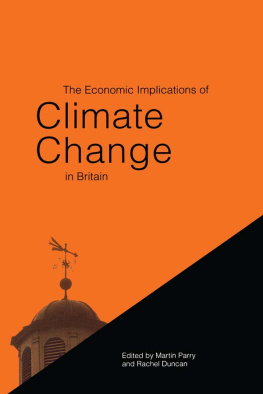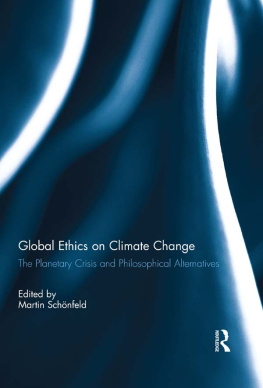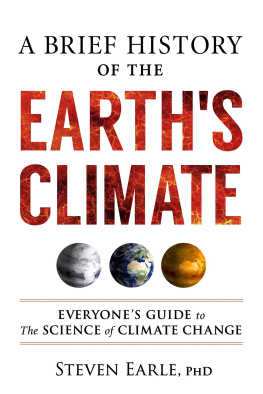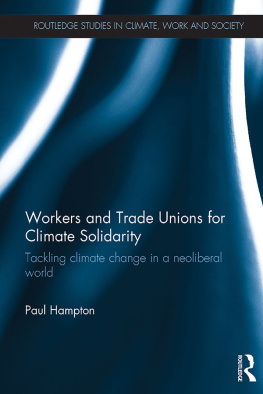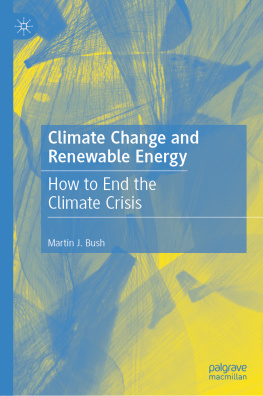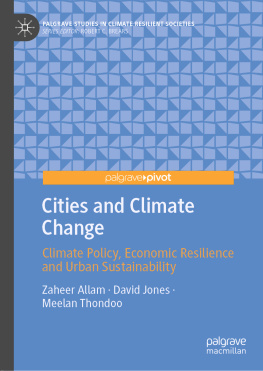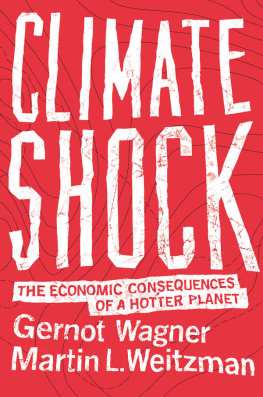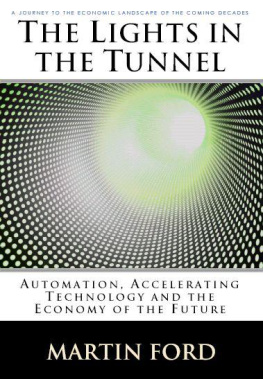The Economic Implications of
Climate
Change
in Britain
The Economic Implications of
Climate
Change
in Britain
Edited by Martin Parry and Rachel Duncan
First published in 1995 by
Earthscan Publications Limited
120 Pentonville Road, London N1 9JN
This edition published 2013 by Earthscan
For a full list of publications please contact:
Earthscan
2 Park Square, Milton Park, Abingdon, Oxon OX14 4RN
Simultaneously published in the USA and Canada by Earthscan
711 Third Avenue, New York, NY 10017
Earthscan is an imprint of the Taylor & Francis Group, an informa business
Copyright Martin Parry and Rachel Duncan, 1995
All rights reserved. No part of this book may be reprinted or reproduced or utilised in any form or by any electronic, mechanical, or other means, now known or hereafter invented, including photocopying and recording, or in any information storage or retrieval system, without permission in writing from the publishers.
A catalogue record for this book is available from the British Library ISBN:
ISBN: 978-1-85383-240-6 (pbk)
Typesetting and figures by PCS Mapping & DTP, Newcastle upon Tyne and Drawing Office, UCL Department of Geography
Contents
by Crispin Tickell
In February 1994, the Green College Centre for Environmental Policy and Understanding was the host for a seminar on the Economic Implications of Climate Change in Britain, together with Martin Parry, then Director of the Environmental Change Unit at the University of Oxford and now Director of the Jackson Environment Institute and the Environmental Studies Programme at University College London. The purpose of this meeting was to take stock, two years after the Rio Summit and one year before the First Conference of the Parties to the UN Framework Convention on Climate Change, of our knowledge of the potential impacts of climate change. There were seventy seminar participants drawn from universities, industry and government. Papers were presented on best estimates of future climate change for Britain, and their likely impact on agriculture, ecosystems, water resources, coastal regions, energy, and the finance and insurance sectors. In each instance, speakers were paired in such a way that those experts concerned with the biophysical aspects of effects were brought together with those more concerned with their economic and social implications. The meeting was thus as much an opportunity for a meeting of minds amongst the speakers as for communication between speakers and audience. The results of this dialogue are to be seen in this book: the chapters represent an attempt to bridge the physical, economic and social aspects of the implications of climate change. In this sense they represent an advance on the first report of the Climate Change Impacts Review Group of the British Department of the Environment (1991).
This book goes to press as the First Conference of the Parties to the UN Framework Convention on Climate Change meets in Berlin. The purpose of this Conference is to agree upon the next steps to be taken towards achieving the Conventions ultimate objective: to achieve stabilization of greenhouse gas concentrations in the atmosphere at a level that would prevent dangerous anthropogenic interference with the climate system. The book is an example of the regional scientific assessment that is needed to distinguish between dangerous magnitudes or rates of climate change and those that can be adapted to by ecosystems and do not threaten the security of food production or the sustainability of economic development. More studies of this kind are needed, particularly in those regions (such as the semi-arid tropics) which are inherently vulnerable to climatic variability today, in order to provide a solid scientific basis upon which international negotiations can move forward.
Crispin Tickell
Green College Centre for Environmental Policy and Understanding
This book brings together a series of papers written by experts on the potential effects of climate change in Britain. All 17 authors are active researchers in this field, four of them are senior authors of the Intergovernmental Panel on Climate Change and three are members of the UK Department of Environments Climate Change Impacts Review Group.
Much of the assessments to date of the effects of climate change have concentrated on impacts on physical resources and landscape. This is true of estimated effects for Britain, for Europe and for impacts worldwide. Thus, while little attention has been paid to the economic implications of changes in resource availability due to climate change, these may be the most important effects for humankind.
For this reason, this collection of papers seeks a balance between the estimation of the effects on physical resources and the evaluation of implications for resource use. Inevitably assumptions are made about effects outside Britain and their consequences for Britain itself. In many cases for example, in the case of food availability and food prices the worldwide effects of climate change working through the world food trade system and finally affecting Britain, may be more important than the effects of climate changes occurring over Britain itself. These and many other implications remain to be explored in much more detail.
The editors and authors acknowledge the support of Nuclear Electric plc; the Centre for Social and Economic Research on the Global Environment (CSERGE); the Water Directorate of the Department of the Environment, (DoE contract PECD/7/7/348); the Chartered Insurance Institute, for permitting the use of edited parts of their report The Impact of Changing Weather Patterns on Property Insurance; and also Megan Gawith for her assistance in the section on subsidence. Thanks to David Pearce and Andrew Sample for their helpful comments on was conducted in collaboration with M D A Rounsevell (Soil Survey and Land Research Centre, Cranfield University); Jianmin Shao (Vaisala TMI Ltd); Philip Jones, Richard Tranter and John Marsh (Centre for Agricultural Strategy, University of Reading); and Tahir Rehman (Department of Agriculture, University of Reading).
Martin Parry, Jackson Environment Institute, University College London
Rachel Duncan, Green College Centre for Environmental Policy and
Understanding
February 1995
Nigel Arnell Reader in Physical Geography, Department of Geography, University of Southampton, Highfield, Southampton SO17 1BJ (Chapter 3)
Paul Brignall Research Associate, Environmental Change Unit, University of Oxford, 1a Mansfield Road, Oxford OX1 3TB (Chapter 4)
Alun Davies Acclimatory Physiology Department, AFRC Institute of Grassland and Environmental Research, Plas Gogerddan, Aberystwyth, Dyfed SY23 3EB (Chapter 4)
Andrew Dlugolecki Chief Manager, UK Operations, General Accident Fire and Life Assurance Corporation, Pithcavlis, Perth, Scotland PH2 0NH (Chapter 6)
Richard Dubourg Research Associate, Centre for Social and Economic Research on the Global Environment (CSERGE), University College London, Gower Street, London, WC1E 6BT (Chapter 3)
Rachel Duncan Research Officer, Green College Centre for Environmental Policy and Understanding, Green College, at the Radcliffe Observatory, Oxford OX2 6HG (01865 311038) (


